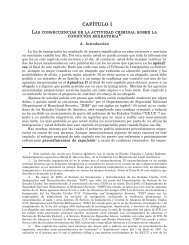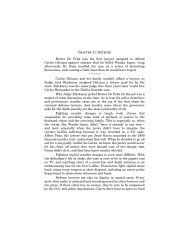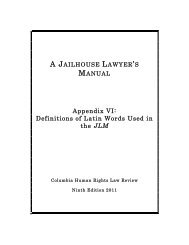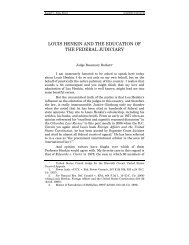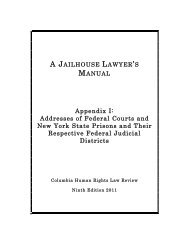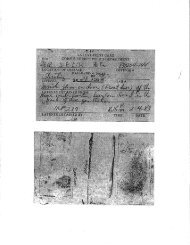A Jailhouse Lawyer's Manual Chapter 14 - Columbia Law School
A Jailhouse Lawyer's Manual Chapter 14 - Columbia Law School
A Jailhouse Lawyer's Manual Chapter 14 - Columbia Law School
You also want an ePaper? Increase the reach of your titles
YUMPU automatically turns print PDFs into web optimized ePapers that Google loves.
disabilities, 270 illiteracy or lack of education, 271 inability to speak or write English, 272 or<br />
youth. 273<br />
A remedy may be unavailable because the prisoner has been transferred out of the<br />
particular prison or jail system, 274 unless the system provides a way to pursue grievances<br />
270. Kuhajda v. Ill. Dep’t of Corr., No. 05-CV-3263, 2006 WL 1662941, at *1 (C.D. Ill. June 8,<br />
2006) (unpublished) (holding that a prisoner who is hearing-impaired and has limited ability to read<br />
and write, and who did not have the assistance of a sign language interpreter, raised a factual issue<br />
concerning availability of remedies); see Elliott v. Monroe Corr. Complex, No. C06-0474RSL, 2007 U.S.<br />
Dist. LEXIS 5242, at *10–11 (W.D. Wash. Jan. 23, 2007) (unpublished) (dismissing for non-exhaustion<br />
where plaintiff with cerebral palsy was provided with assistance and had filed numerous grievances,<br />
though he had not actually exhausted any).<br />
271. Langford v. Ifediora, No. 5:05CV00216WRW/HLJ, 2007 WL <strong>14</strong>27423, at *3–4 (E.D. Ark.<br />
May 11, 2007) (unpublished) (holding plaintiff’s age, deteriorating health, and lack of general<br />
education, combined with failure to provide him assistance in preparing grievances, raised a factual<br />
issue concerning the availability of the remedy to him); Kuhajda v. Ill. Dep’t of Corr., No. 05-CV-3263,<br />
2006 WL 1662941, at *1 (C.D. Ill. June 8, 2006) (unpublished) (stating hearing-impaired prisoner’s<br />
limited ability to read and write, and lack of a sign language interpreter, raised a factual issue<br />
concerning availability of remedies). In the unreported decision Davis v. Corr. Corp. of Am., 131 F.<br />
App’x 127, 128–29, (10th Cir. Apr. 18, 2005) (unpublished), the court rejected the argument that the<br />
plaintiff’s educational deficiencies (he said he was a “slow learner and thinker” still working to obtain a<br />
G.E.D.) should excuse his failure to exhaust, noting that his papers “did not describe insurmountable<br />
barriers to his filing of grievances and did not show that prison officials had effectively foreclosed his<br />
efforts.” See also Ramos v. Smith, No. 05-5278, 187 F. App’x 152, 154 (3d Cir. June 2, 2006)<br />
(unpublished) (rejecting claim of illiteracy, since federal regulations require assistance to illiterate<br />
prisoners, and he did not allege that he asked for such assistance); Georgacarakos v. Watts, <strong>14</strong>7 F.<br />
App’x 12, <strong>14</strong>–15 (10th Cir. Aug. 18, 2005) (unpublished) (ignoring litigant’s plea to appoint counsel if<br />
his exhaustion presentation was inadequate, in light of his lack of “means and sophistication”).<br />
272. Several courts have denied summary judgment to prison officials where a monolingual<br />
Spanish-speaking plaintiff alleged he could not understand or follow the grievance procedures because<br />
he could not get them, or get help with them, in Spanish. See Abel v. Pierson, No. 05-264-GPM, 2008<br />
WL 509466, at *4 (S.D. Ill. Feb. 13, 2008) (unpublished); Ramos v. Rosevthal, No. 4:06cv3158, 2007<br />
U.S. Dist. LEXIS 37360, at *3 n.1 (D. Neb. May 17, 2007) (unpublished); Gonzalez v. Lantz, No. 3:03-cv-<br />
2264 (SRU)(WIG), 2005 U.S. Dist. LEXIS <strong>14</strong>702, at *8–10 (D. Conn. July 20, 2005) (unpublished).<br />
273. One appeals court has rejected the argument that a juvenile prisoner complaining of<br />
excessive force should be excused from failure to use the grievance process in part because he was a<br />
juvenile. Brock v. Kenyon County, Ky., No. 02-5442, 2004 WL 603929, at *4 (6th Cir. Mar. 23, 2004)<br />
(unpublished); see also Minix v. Pazera, No. 1:04-CV-447 RM, 2005 U.S. Dist. LEXIS 44824, at *12–13<br />
(N.D. Ind. July 27, 2005) (holding that a juvenile’s mother’s repeated complaints to numerous officials<br />
did not exhaust her son’s complaint of being beaten and raped). By contrast, in Lewis v. Gagne, 281 F.<br />
Supp. 2d 429, 433–35 (N.D.N.Y. 2003), the court held that a juvenile detainee’s mother, who had<br />
complained to facility staff and contacted an attorney, family court, and the state Child Abuse and<br />
Maltreatment Register, and whose complaints were known to the facility director and agency counsel,<br />
had made sufficient “reasonable efforts” to exhaust, without explicitly commenting on the juvenile<br />
detainee’s own status or capacity to follow administrative procedures.<br />
274. Rodriguez v. Westchester County Jail Corr. Dep’t, 372 F.3d 485, 488 (2d Cir. 2004);<br />
Ammouri v. Adappt House, Inc., No. 05-3867, 2008 U.S. Dist. LEXIS 47129, at *10–12 (E.D. Pa. June<br />
12, 2008) (unpublished) (noting that plaintiff was repeatedly told he could not grieve matters from his<br />
previous institution); Davis v. Kirk, No. H-06-2381, 2007 U.S. Dist. LEXIS 91024, at *24–25 (S.D. Tex.<br />
Dec. 11, 2007) (unpublished) (holding prisoner’s grievance appeal was moot on transfer); Thomas v.<br />
Maricopa County Bd. of Supervisors, No. CV 07-0258-PHX-DGC (DKD), 2007 U.S. Dist. LEXIS 79334,<br />
at *9–10 (D. Ariz. Oct. 12, 2007) (unpublished) (declining to dismiss where the prisoner did not have<br />
knowledge of the violation until after his release and the grievance policy did not provide for grievances<br />
after release); Bradley v. Washington, 441 F. Supp. 2d 97, 102–03 (D.D.C. Aug. 2, 2006) (unpublished)<br />
(holding D.C. remedies became unavailable upon prisoner’s transfer to federal medical facility, since<br />
D.C. procedures say they apply to facilities under authority, jurisdiction, or contract with D.C.);<br />
Barnard v. District of <strong>Columbia</strong>, 223 F. Supp. 2d 211, 2<strong>14</strong> (D.D.C. 2002) (unpublished) (holding that a<br />
prisoner who was first hospitalized, then involved in hearings, then transferred during the 15 days he



